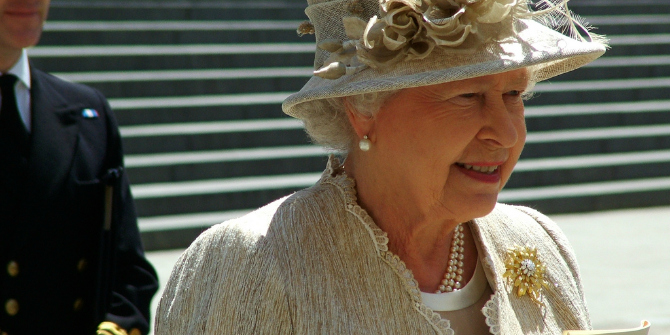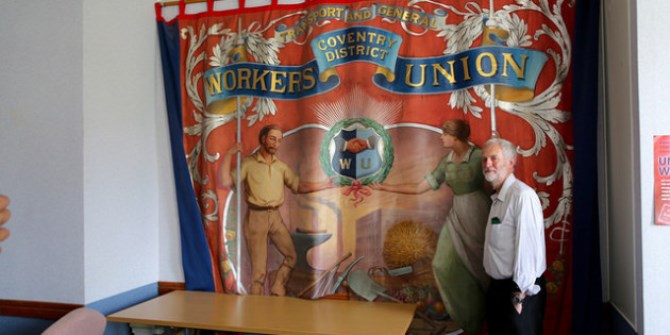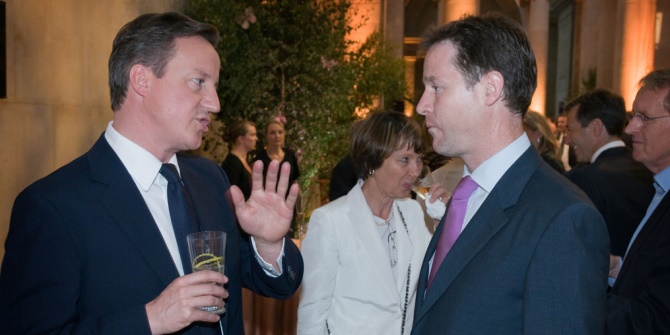 The Queen recently gave a speech in Germany where she said that “division in Europe is dangerous”. This remark met with controversy in the UK, where advocates of a Brexit accused the monarch of meddling in politics. Insofar as her speech contained any political message, writes David Shiels, it was directed at the leaders of all countries in Europe who sometimes seem to forget the original purpose behind the European project – the reconciliation of the peoples and nations of a divided continent.
The Queen recently gave a speech in Germany where she said that “division in Europe is dangerous”. This remark met with controversy in the UK, where advocates of a Brexit accused the monarch of meddling in politics. Insofar as her speech contained any political message, writes David Shiels, it was directed at the leaders of all countries in Europe who sometimes seem to forget the original purpose behind the European project – the reconciliation of the peoples and nations of a divided continent.
On June 26th, Queen Elizabeth II and her husband, the Duke of Edinburgh, marked the end of their four-day state visit to Germany by visiting Bergen Belsen, the concentration camp liberated by British troops at the end of the Second World War. Seventy years after the end of the war, the Queen’s presence at Bergen Belsen was an appropriate moment to reflect on the horrors witnessed in Europe during the last century, and to acknowledge what she referred to as the ‘complete reconciliation between our countries’ that has since occurred.
The theme of reconciliation has been important throughout Queen Elizabeth’s reign. Ever since her first state visit to West Germany fifty years ago, Her Majesty has shown great leadership in confronting difficult issues associated with the past. She has undertaken journeys that would once have been controversial, including a visit to South Africa in 1995 shortly after the end of apartheid and her more recent visit to Ireland in 2011.
But it is the restoration of friendly Anglo-German relations since the end of the Second World War that has been most important from the point of view of Britain’s relationship with the continent. The Queen’s visit to West Germany in 1965 was the culmination of 20-year process of reconciliation following the end of the Second World War, and came at a time when the country was re-emerging as a power in Europe. The Queen was welcomed enthusiastically in the country because it was felt that her visit put a stamp of legitimacy on West Germany’s status as an equal player on the world stage.

The visit also had a special diplomatic significance in Britain’s eyes, especially from the point of view of the country’s efforts to join the European Economic Community. The first application to join the EEC had been vetoed by French President Charles de Gaulle two years previously, but the new Labour Government under Harold Wilson was already contemplating a second attempt. The German Government in Bonn was therefore a key ally and it was in this political context that the Queen spoke of the benefits of the ‘closest cooperation’ between the two countries.
The state visit last week place under very different political circumstances in Europe but the relationship between the UK and Germany remains important especially from the British point of view. The Government in Berlin is seen as a vital ally for David Cameron’s renegotiation of Britain’s membership of the EU.
It is not surprising, therefore, that the Queen’s speech in Berlin contained a very positive assessment of the future of Anglo-German relations. Addressing an audience that included the Chancellor of Germany, Angela Merkel, and the British Prime Minister, David Cameron, the Queen said that “Britain and Germany have achieved so much by working together…I have every confidence that we will continue to do so in the years ahead”. The Queen also warned that “division in Europe is dangerous” and “we must guard against it in the West as well as in the East of our continent”.
In Britain, this speech was reported as a signal of the Queen’s implicit support for continued membership of the European Union. This has upset some opponents of the EU, particularly the UKIP leader, Nigel Farage, who has accused the Government of politicising the state visit to Germany. ‘Butt out Eur Majesty’ was the typically robust headline on the front page of The Sun.
What has been forgotten in this debate is that the Queen was not speaking to a domestic audience, where the true significance of her words has been misunderstood. The Queen, unlike any current political leader in Europe, can speak with the authority of someone who has lived through the Second World War and who has witnessed the transformation of Europe over the last seven decades. In the eyes of many Europeans, especially young Europeans, Elizabeth II represents stability and continuity and remains a living link with the wartime generation.
Insofar as her Berlin speech contained any political message, it was directed at the leaders of all countries in Europe who sometimes seem to forget the original purpose behind the European project – the reconciliation of the peoples and nations of a divided continent.
The Queen will not enter the debate on the UK’s future in the EU. If David Cameron’s renegotiation strategy fails, and the British public votes to leave the EU, this would not mean an end to Britain’s engagement with European affairs. But it would be unfortunate if, in the final years of the Queen’s reign, the country’s political leaders failed to recall the dangers of a divided Europe.
 David Shiels holds a PhD from the University of Cambridge. He is a College Research Associate at Wolfson College and had has been an Archives By-Fellow at Churchill College. He is completing a biography of Enoch Powell The Outsider to be published by I.B. Tauris.
David Shiels holds a PhD from the University of Cambridge. He is a College Research Associate at Wolfson College and had has been an Archives By-Fellow at Churchill College. He is completing a biography of Enoch Powell The Outsider to be published by I.B. Tauris.







